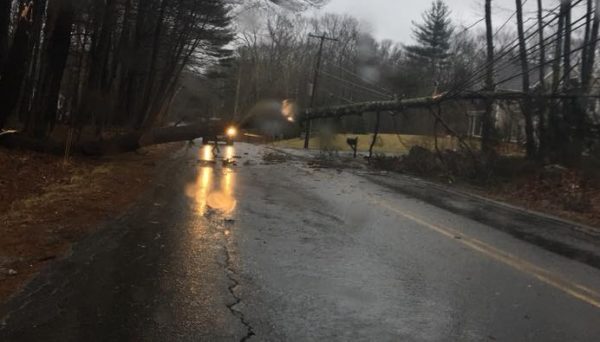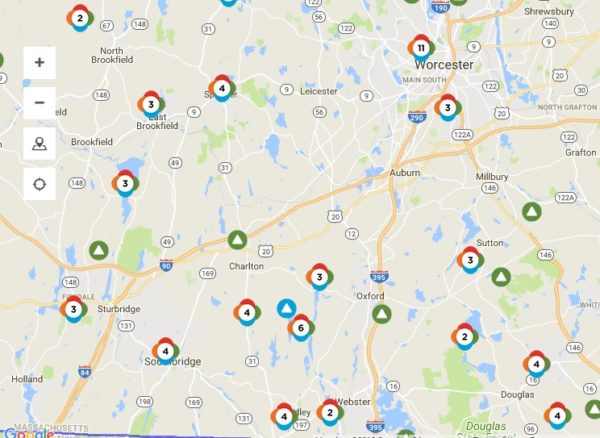Cleaning Up From The March Nor’Easter

Tree Across Oxford Road In Charlton
The high winds from the March Nor’easter have knocked out power to hundreds of thousands of people across New England. How did you make out from the storm? Any trees down in your yard? Do you have electricity or internet? Even though the most of the storm has moved past the Webster area, there is still a possibility of scattered rain or snow showers depending on the temperatures.
National Grid is working to restore power to outage areas and will continue to through Monday. Because of the strong winds, it is too dangerous for the utility company to send crews up in bucket trucks to work on power lines. If it is safe to do so, feel free to share photos of storm damage near your house on our Facebook page. We will update this page as more information becomes available.
If you are a National Grid customer you can check the status of power outages by clicking on the map below. It updates every 15 minutes.
- Never touch downed power lines, and always assume that any fallen lines are live electric wires. If you see one, report it immediately to National Grid or your local emergency response organization.
- Power problems can sometimes interrupt public water supply systems or disable well pumps, so it’s an especially good idea to keep a supply of bottled drinking water handy, as well as some canned food.
- People who depend on electric-powered life support equipment, such as a respirator, should let National Grid know. To register as a life support customer, call the company’s Customer Service Center at 1-800-322-3223.
- Check on elderly family members, neighbors and others who may need assistance during an outage period.
- Report power outages at nationalgridus.com/OutageCentral or call: 1-800-465-1212.
- If you use a generator to supply power during an outage, be sure to operate it outdoors. Before operating generators, disconnect from National Grid’s system by shutting off the main breaker located in the electric service panel. Failure to do this could jeopardize the safety of line crews and the public.
- If you lose power, turn off any appliances that were on when the power went off, but leave one light on so you will know when power is restored.
- Get Out – All occupants should leave the house immediately. Do not use the telephone or light switches for any reason.
- Call National Grid – After leaving the house and reaching a safe environment, call the National Grid 24-hour gas emergency number for MA: 1-800-233-5325
- Stay Out – Do not return to your home until National Grid tells you it is safe.
- The symptoms of carbon monoxide poisoning are similar to those of the flu. Depending upon the amount of carbon monoxide in the air and length of exposure, symptoms may include headaches, weakness, confusion, chest tightness, skin redness, dizziness, nausea, sleepiness, fluttering of the heart or loss of muscle control.
- If you suspect carbon monoxide is present in your home, go outside immediately and breathe deeply; then call 911. If symptoms are severe, get medical attention right away.
If you would like to receive updates from National Grid you can text the word STORM to NGRID (64743) or use your mobile device to track outages and estimated times of repairs at www.nationalgridus.com/outage-central.

